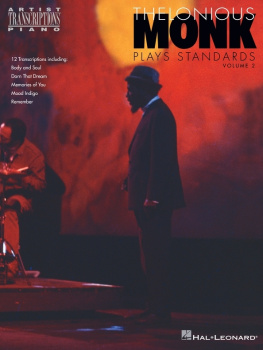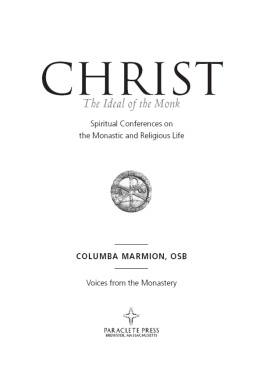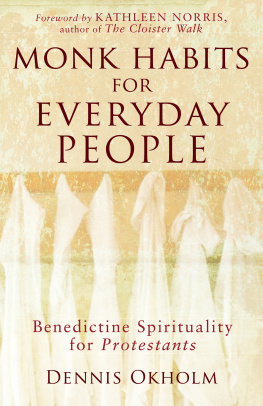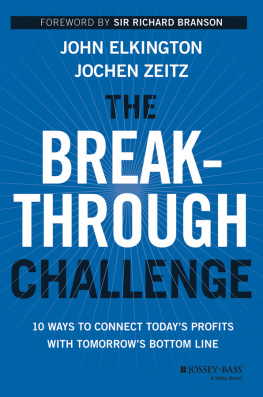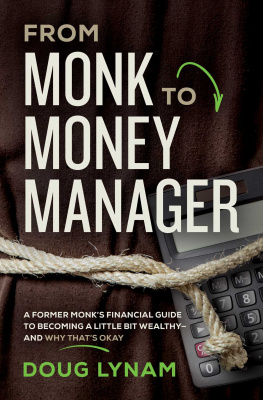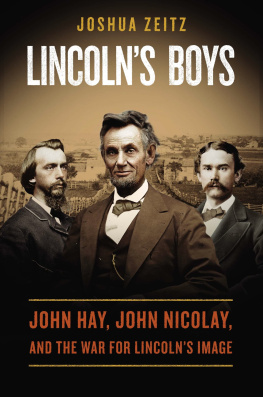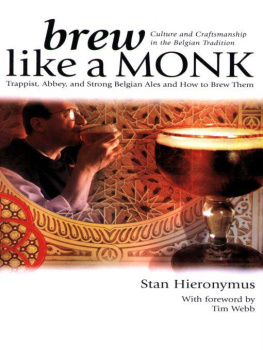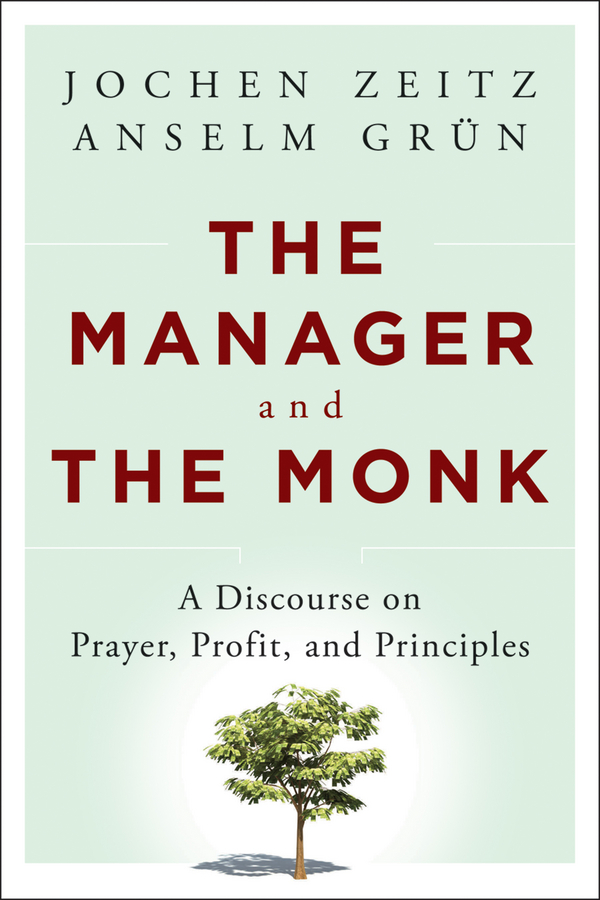CONTENTS

Cover design by Adrian Morgan
Cover image: Copyright Thinkstock
Originally published in 2010 in German as Gott, Geld und Gewissen
Copyright by Vier-Trme GmbH, Verlag, D-97359 Mnsterschwarzach Abtei.
All rights reserved.
English translation by Susan Thorne
Published by Jossey-Bass
A Wiley Imprint
One Montgomery Street, Suite 1200, San Francisco, CA 94104-4594 www.josseybass.com
No part of this publication may be reproduced, stored in a retrieval system, or transmitted in any form or by any means, electronic, mechanical, photocopying, recording, scanning, or otherwise, except as permitted under Section 107 or 108 of the 1976 United States Copyright Act, without either the prior written permission of the publisher, or authorization through payment of the appropriate per-copy fee to the Copyright Clearance Center, Inc., 222 Rosewood Drive, Danvers, MA 01923, 978-750-8400, fax 978-646-8600, or on the Web at www.copyright.com . Requests to the publisher for permission should be addressed to the Permissions Department, John Wiley & Sons, Inc., 111 River Street, Hoboken, NJ 07030, 201-748-6011, fax 201-748-6008, or online at www.wiley.com/go/permissions .
Limit of Liability/Disclaimer of Warranty: While the publisher and author have used their best efforts in preparing this book, they make no representations or warranties with respect to the accuracy or completeness of the contents of this book and specifically disclaim any implied warranties of merchantability or fitness for a particular purpose. No warranty may be created or extended by sales representatives or written sales materials. The advice and strategies contained herein may not be suitable for your situation. You should consult with a professional where appropriate. Neither the publisher nor author shall be liable for any loss of profit or any other commercial damages, including but not limited to special, incidental, consequential, or other damages. Readers should be aware that Internet Web sites offered as citations and/or sources for further information may have changed or disappeared between the time this was written and when it is read.
Jossey-Bass books and products are available through most bookstores. To contact Jossey-Bass directly call our Customer Care Department within the U.S. at 800-956-7739, outside the U.S. at 317-572-3986, or fax 317-572-4002.
Wiley publishes in a variety of print and electronic formats and by print-on-demand. Some material included with standard print versions of this book may not be included in e-books or in print-on-demand. If this book refers to media such as a CD or DVD that is not included in the version you purchased, you may download this material at http://booksupport.wiley.com . For more information about Wiley products, visit www.wiley.com .
Library of Congress Cataloging-in-Publication Data
Library of Congress Cataloging-in-Publication Data has been applied for and is on file with the Library of Congress.
ISBN 9781118479414 (cloth); ISBN 9781118554913 (ebk);
ISBN 9781118555002 (ebk); ISBN 9781118555866 (ebk)
For Dr. Bernd Deininger with grateful acknowledgment and thanks for his assistance in the development of this book
PREFACE
In choosing to read The Manager and the Monk , you have chosen to accompany us on a journey to exchange ideas, challenge long-held belief systems, and discover new possibilities in us all. In fact, you have now become an integral part of this journey of discovery, and as we continue our dialogue, you will foster, deepen, and expand on your own inner dialogue as well.
Our conversation first began in 2008 at an onstage discussion in front of an audience in Nuremberg. As The Monk and The Manager, we faced one another from opposite ends of the spectrum. On one end, Anselm Grn represented a life lived in spiritual practice, and on the other, Jochen Zeitz embodied a life synonymous with business and financial success. On that fateful day we confronted such challenging questions as: Do core values stand a chance in the world of business? To what extent does a monk think like a manager? How much consideration and empathy can a manager afford to show? What do money and success mean to us?
Although we did not have time that day to explore those questions in detail, something intangible but necessary seized us. We were able to gain a basic impression of the others ideas and instinctively knew that we had happened upon pieces of a puzzle we had both been trying to solve but couldnt finish individually, based just on our own focused and concentrated life experiences. We knew this would be the beginning of another level of enlightenment and knowledge in our lives if we continued our conversation. Since then, we have repeatedly met in person and exchanged e-mails and phone calls. Over time, we developed a unique relationship, one always based on respect and a desire for mutual understanding.
Before our first meeting, we knew a little about each other, thanks to the media:
Anselm Grn was The Monk, a Benedictine monk from Mnsterschwarzach Abbey near Wrzburg. He was a renowned author of numerous books on spirituality and counseling and a prominent clergyman. As Cellarer of the abbey, he was responsible for the financial and business management of a community of three hundred monks and staff, overseeing approximately twenty workshops and several hectares of farmland, meadows, and wooded areas.
The Manager was Jochen Zeitz, a citizen of the world who had, at that time, been chairman and CEO of PUMA, the publicly listed sporting goods and lifestyle company, for eighteen years, since the young age of thirty. The company is headquartered in Herzogenaurach, Franconia, near Nuremberg, and is just 70 kilometers from Mnsterschwarzach Abbey. PUMA is a globally recognized brand directly employing over nine thousand employees and providing work for over fifteen thousand people through factories that produce PUMA products. The group has annual sales of over billion.
We were aware that the missions and goals of our organizations and our lifestyles were worlds apart; this is exactly what drew us together. As peopleand as authorswe were initially surprised and intrigued to find that there is more that unites us than divides us. We both wish to protect the environment, improve society, and employ sustainable methods, both within our companies and beyond. As managers, we must learn to conduct business without harming people or the environment. As spiritual human beings, we look for ways to find ourselves and create more unity without losing sight of the need for efficient management.
During this journey, we did not simply exchange opinions: we also exchanged roles to experience each others world. The Manager spent some time in the monastery, where he was able to find peace and see his world from a different point of viewand where many things fell into perspective. In return, The Monk expanded his knowledge of virtual companies such as PUMA and the fast-paced, electronically networked world of targets and numbers by visiting the group headquarters and attending conferences.
To this day, we continue our exchanges because our main objective is to improve ourselves and our environment, every day and in every way we can. We hope that in reading our book, you too will feel encouraged and inspired to seek the same goal and open your world and mind, continuing our conversation within yourself.
Anselm Grn and Jochen Zeitz
CHAPTER 1


